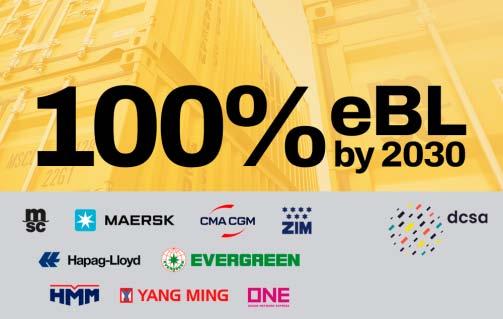
2 minute read
MSC commits to achieve 100% Electronic Bill of Lading adoption by 2030
• MSC has commied to transion to 100% use of electronic Bills of Lading (eBLs) by 2030, with an intermediate target of 50% within five years.
• MSC launched its own eBL soluon in April 2021, leading the way in the container shipping industry, and simplifying and speeding up the shipping experience for customers.
Advertisement
• Security is another major benefit, as the eBL ensures zero risk of documentary fraud, forgery or loss.
• The 100% eBL Commitment has also been signed by the eight other carrier members of the Digital Container Shipping Associaon (DCSA).
• This milestone moment will accelerate the digitalizaon of container trade.
Cont’d. from Pg. 3
This milestone moment represents a significant step forwardforthecompanyandourcustomers.
The eBL is the electronic version of the traditional, paper-based Bill of Lading (BL), one of the most important trade documents in container shipping. The eBL replicates the exact same functions as a paper BL, but in digital form, thereby offering a more efficient, secureandsustainablealternative.
“IamdelightedthatMSCistakingthisbigsteptowards paperless trade. Our pioneering MSC eBL solution has already transformed the shipping experience for numerous customers by making the process faster, simplerandmoreefficientthaneverbefore.
On top of these benefits, moving to 100% eBL will contribute towards our climate goals, as we move towardsnetzero2050,”said,SorenToft,CEOofMSC.
MSC eBL: the story so far
MSC was one of the earliest adopters of the eBL. Our MSC eBL solution was launched in April 2021 after a two-year pilot project in India and at a perfect time in the industry considering the delayed delivery of paper BLs duringtheCOVID-19pandemic.
Customers appreciate the convenience, speed and simplicity of MSC eBL, which is accessible 24/7 from any device or location. The technology enables eBLs to be transmitted in minutes, compared to days or weeks, leading to significant cost savings, faster payment processes and reduced administration for users. The switch to eBLs also directly reduces the carbon footprint ofallpartiesinvolved.
Offered via the blockchain-based WAVE BL platform, MSC eBL is fully secure. Documents are encrypted on upload and data is secured using automatic verification and authentication, so there is no risk of documents endingupinthewronghands.Blockchain-basedtransfer of data also helps to eliminate the risks of document forgery,theftorloss,ascomparedtothetransportationof paper-basedBls.
MSC eBL is a key offering in our growing portfolio of digital solutions and a vital component of our vision for thepaperlessandfrictionlessfutureofglobaltrade. Joining forces to advance paperless trade
The 100% eBL Commitment has been signed by the eight other ocean carrier members of the Digital Container Shipping Association (DCSA), representing a significant step forward in the digitalizationofglobalcontainertrade.
MSC is excited to join with the DCSA and the wider industry to commit to 100% adoption of a DCSA digital standards-based eBL, and to continue to play a role in makingthisgoalareality.
However, reaching the ambitious target of 100% adoption will only be possible if the entire maritime supply chain is on board. This is why MSC and the other DCSAcarriermembersareaskingthatallstakeholders–from shippers and forwarders to governments, financial institutions and insurance agencies – work together to makethiscommitmentareality.
The digitalization of trade documents within the framework of DSCA standards holds great potential to remove friction in international trade, benefitting both thecustomerexperienceandtheenvironment.
While the eBL is on its way to becoming widely adopted, the change will also speed up the shipping process and facilitate the implementation of other forms of e-documentation (such as the certificate of origin and packinglist)inthefuture.



